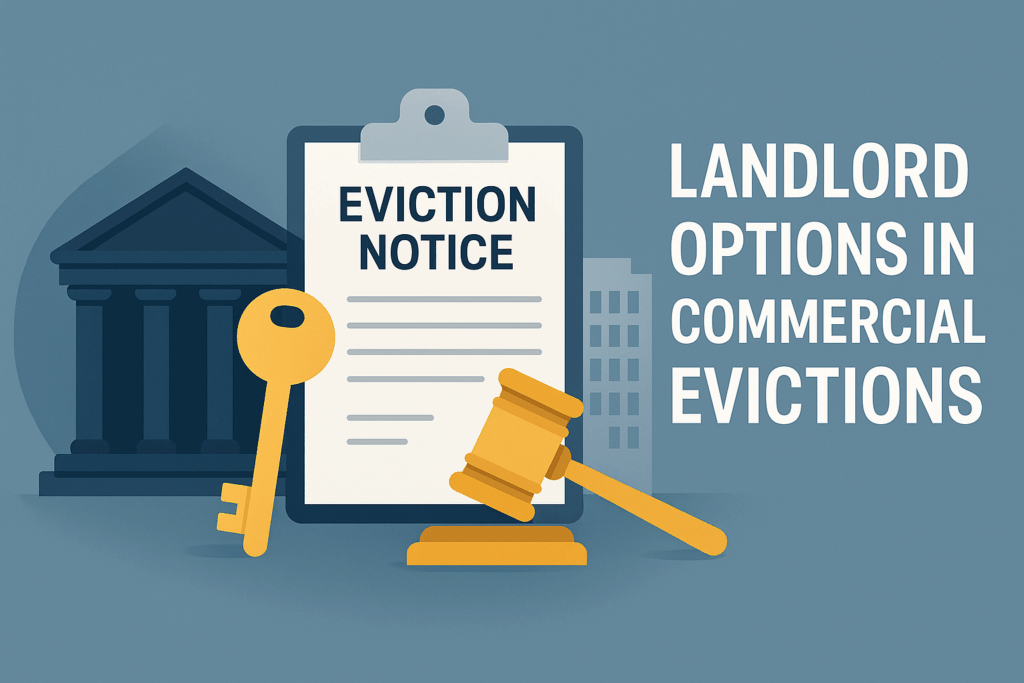When a commercial tenant defaults, Florida landlords have more than one legal path to protect themselves. Unlike residential evictions, commercial leases and statutes give landlords a range of remedies that can be tailored to the situation. The strategic question is not only what remedy to elect, but also when and how to bring the claims.
The Three Classic Commercial Lease Remedies + Acceleration
1. Terminate and Retake for the Landlord’s Own Account
In this option, the landlord terminates the lease, retakes the premises, and re-lets the space for its own benefit. The tenant is liable for rent and damages up to the date of termination, but future rent usually ends unless the lease has a survival or acceleration clause. This path makes sense when the landlord wants a clean break and quick re-tenanting.
2. Retake and Re-Let for the Tenant’s Account
Here, the landlord retakes possession without terminating the lease, re-lets the space, and applies the new rental stream toward the tenant’s obligations. The tenant remains liable for any deficiency between the contract rent and what is actually received, plus reasonable re-letting costs like commissions, tenant improvements, and marketing. This is a common option when the landlord wants both possession and to preserve the ability to recover the full economic loss.
3. Stand By and Sue for Rent as It Comes Due
The landlord can elect not to retake possession and instead hold the tenant to its lease obligations, suing for each installment of rent as it matures. This preserves the lease but leaves the tenant in possession. It’s rarely chosen because most landlords want the space back, but it can be useful if the tenant is financially strong and the lease economics are favorable.
4. Acceleration (If the Lease Allows It)
If the lease includes a valid acceleration clause, the landlord can declare the entire remaining balance of the lease term immediately due. Courts generally enforce these clauses if they are clear and provide for mitigation or credit if the premises are re-let. This can be a powerful tool but must be expressly written into the lease.
Filing Strategy: Possession Only vs. Possession + Damages
Another tactical question is whether to file one lawsuit or two. In Florida, possession claims proceed under summary procedure, designed to move quickly, while damages follow the slower, standard civil track. Landlords have two main options:
- One lawsuit, split by counts (most common): File a single complaint with Count I for possession and additional counts for damages and guaranty liability. Ask the court to sever or abate the damages counts so the possession count moves quickly. Once you have the writ of possession, you can resume prosecution of the money claims. This is efficient and keeps everything before one judge.
- Two separate actions (when damages are significant): If post-possession damages will be substantial and complex—such as a large deficiency after re-letting, major property damage, or guarantor litigation—it may be better to keep the eviction case “lean” and file a separate Circuit Court action for damages. This avoids slowing the possession track while giving the damages claims room for full discovery and presentation.
Damages Accrue Over Time
Even after possession is resolved, damages can continue to accrue. Without an acceleration clause, landlords typically recover:
- Past-due rent through the date of judgment.
- Future installments as they come due, or a deficiency after re-letting for the tenant’s account.
- Double rent for holdover.
- Property damage and repair costs.
- Attorneys’ fees and costs, if provided in the lease.
Courts often reserve jurisdiction so landlords can return for later damages hearings as more rent accrues or once re-letting occurs.
The Bottom Line
Commercial evictions are not one-size-fits-all. Landlords must decide both which remedy to elect and how to structure the lawsuit to balance speed of possession with the ability to maximize recovery. At Douglas Firm, we help landlords evaluate these options from day one and choose the path that fits both the lease and the business goal.
